Arts & Culture

AS THIS PANDEMIC rages on and people are isolated in their homes with their intimate partners, many are more vulnerable than ever to violence. According to the Centers for Disease Control and Prevention, approximately 1 in 4 women and nearly 1 in 10 men experience sexual violence, physical violence, or stalking by an intimate partner during their lifetime. In addition, an average of 24 people per minute are victims of rape, physical violence, or stalking by an intimate partner in the United States—more than 12 million women and men during a single year.
Odyssey Impact, an interfaith nonprofit that addresses social issues through storytelling and media, hopes to change this with a four-part Healing the Healers video series, directed by Kirsten Kelly, that features interfaith peer-to-peer conversations about domestic violence. It is scheduled for a January 2021 release on healingthehealers.org.
This is the second series under the Healing the Healers name. The first was a five-part video series that grew out of a pastor’s efforts in Newtown, Conn., to deal with the aftereffects of the Sandy Hook school massacre; it includes conversations with clergy, social workers, and first responders who have been on the front lines as different communities have dealt with traumatic events. The second Healing the Healers series on domestic violence likewise addresses a crisis by modeling honest conversation about a difficult topic across faith lines.

Artist Makoto Fujimura uses materials and techniques from nihonga, a Japanese style of painting. The pigments are pulverized minerals and precious metals applied in multiple layers, in what he describes as “a slow process that fights against efficiency.” Prayer and contemplation are woven into the work. The tiny mineral particles refract light, often creating subtle prismatic effects. It is a style of art made for the type of long, unforced gaze that slowly reveals evermore depth. Deceptively simple and quietly extravagant.
Fujimura’s thoughts on art, theology, and culture are, like his paintings, many-layered and refractive, celebrating God as love, beauty, and mercy while also contending with pain and desolation. He is a mystic as well as a painter, and in his latest book, Art and Faith: A Theology of Making, he speaks out of his spiritual and his artistic practice.
But Fujimura also builds on three decades of reaching far outside his studio to evangelize on the necessity of art for human thriving and the call to shift from fighting over culture to caring for and nurturing it. He founded the International Arts Movement in 1992, which facilitates connections and communication between groups seeking to creatively and positively impact the culture, whether they are from the arts, music, business, education, or social change organizations.

Lori Greene is a mosaic artist living in Minnesota. She spoke to Sojourners' Jenna Barnett about creating the first permanent memorial to sexual violence survivors in the United States.
“WHEN SARAH Super asked if I would help create a memorial to survivors of rape and sexual assault, I said ‘yes’ immediately. I’m also a survivor, so it was a no-brainer. Burying pain will not help us recover.
The memorial [in Minneapolis] is painful, but it’s not just pain. I call the first [of the five] panels ‘Sorrow.’ A person in red is curled up in the snow. It’s dark; there are trees everywhere. In panel two are two figures: the same figure, who is clearly crying, and a purple figure holding them. There’s a little sunrise on the horizon. We have a memorial to Holocaust victims. We have the new lynching memorial. And these things are making a difference.
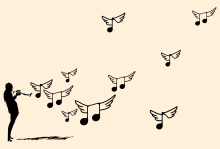
WHEN THE CHAOS gets too much, I listen to jazz. I’m not an aficionado. I just know that brave jazz refreshes my freedom. Lately, I’ve been listening to a lot of jazz.
The stay of execution offered by a COVID-19 vaccine allows for a giddy, perilous optimism. Even a minute crack in our coronavirus armor brings up emotions too dangerous, too chaotic to express: A trembling wave of the suffering we have endured, heavy across the shoulders like the splintery weight of the cross.
For ballast against overwhelming rage, I turn to The Five Quintets by poet Micheal O’Siadhail: “Be with me Madam Jazz I urge you now, / Riff in me so I can conjure how / You breathe in us more than we dare allow.”

Pixar’s latest film Soul, opens to the sound of a Queens, New York, middle school’s band class, led by Joe Gardner, a middle-aged, aspiring jazz musician. As someone who played the trumpet in my Queens middle school’s band, the discordant, yet earnest attempt at music immediately transported me back to Mr. Stier’s classroom in I.S. 109, circa 1992. Just as in Joe’s class, the walls of Mr. Stier’s room were covered with jazz posters; he wore a ponytail and, by my memory, he also had an earring.
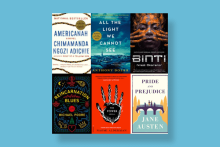
Reading was the safest way to travel this year — sometimes to another decade and another brand of violence, sometimes to a different continent or a different galaxy altogether. Below are Sojourners' editors' favorite books of the year. Most of these books came out years ago, but by reading them through the lens of 2020, we found new wisdom, escape, resonance, and hope.

While Godmothered and its fairy are far from cinematic perfection, by the time the credits roll, Eleanor and Mackenzie have helped each other step more fully into who they both truly were meant to be. In this way, their relationship — minus the wand, the fairy dust, and any promise of true-love-happily-ever-afterness — more realistically resembles actual godparenting.

When I sat down to watch Netflix’s film adaptation of August Wilson’s play Ma Rainey’s Black Bottom, I was hoping to be uplifted by the Black excellence I was sure to find in a film helmed by Viola Davis and the late Chadwick Boseman. I was ready to exhale and escape. But while the anticipated excellence exceeded my high expectations, it didn’t take me long to realize that the uplift I’d hoped for would not be found in this story: Ma Rainey’s Black Bottom is a tragedy.

The scripture-inspired title of Obama’s latest book comes from the idea that a better America ― one that lives more fully into its democractic promise ― is still possible. “[E]ven if we experience hardships and disappointments along the way, that I at least still have faith we can create a more perfect union. Not a perfect union, but a more perfect union,” Obama told CBS 60 Minutes correspondent Scott Pelley in a Nov. 16 interview.
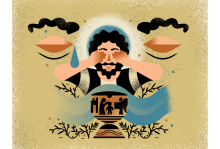
I rub my hand across the stone font
Where Jon Meacham took on the water
Of baptism and signed on to the cross
In an olive oil signature made for words.
The empty sanctuary now quiet for prayer echoes
With last night’s lecture on the future of democracy.
Light pours through the stained glass window
With a narrative of Saul, struck down blind

Tom Sine has served as a futures innovation consultant for various denominations and organizations and Dwight J. Friesen is associate professor of practical theology at the Seattle School of Theology and Psychology. They spoke with Sojourners associate editor Da’Shawn Mosley about their book 2020s Foresight.
Sojourners: What motivated you to write this book?
Tom Sine: Essentially, a desire to write a more compelling book on the changes we’re facing in this pandemic and recession. Churches rarely do forecasting. As a consequence, they’re not ready for the next crunch. They care about their people, but they’re not thinking, “What’s going to happen to them as the recession gets worse?”
Dwight J. Friesen: Our book intends to say, “Listen, we don’t have to be passive bystanders to whatever the new normal’s going to be.” We can be proactive.

AS A LATINA, I waited with eager anticipation for the publication of Robert Chao Romero’s Brown Church: Five Centuries of Latina/o Social Justice, Theology, and Identity . As a historian, Romero is the best person to take us through the history of the Latin American church, and he tells it truly, not wishing to shield the reader from the horrors of colonization. He begins with the exploitation and conversion “by the sword” that began under the rule of the Spanish conquistadores, who brought to the Americas their Roman Catholic faith—along with their hunger for gold and other resources. Early Catholic missionaries such as Friar Antonio de Montesinos and Bartolomé de las Casas sought to divorce the faith from the Spanish colonial project and condemned the latter with courage and fervor.
It is worthwhile to note that Romero brings his readers all the way to the present, introducing them to living Latinx theologians and their work. For many readers, his chapter on “Recent Social Justice Theologies of U.S. Latinas/os” will be a great resource for delving deeper into the works of living Latinx scholars and practical theologians. While the book heavily features male scholars and theologians, it was heartening to see this section highlight Mujerista theology and the work of Latinas doing theology—women such as Elizabeth Conde-Frazier, Sandra Maria Van Opstal, Noemi Vega Quiñones, and Zaida Maldonado Pérez.

2020 WAS A YEAR of ecological breakdown. Simultaneous climate disasters have roared, including the worst wildfire season in the history of California and, as I write this, the most active hurricane season on record in the Atlantic. Meanwhile, freak wind storms called derechos plagued the Midwest and heatwaves baked the Southwest. In the midst of such devastation, it can seem downright irresponsible to search for hope. Yet, the paradoxical call of the cross is that, in the deepest darkness, joyful and beautiful transformation might be possible.
In The Green Good News, T. Wilson Dickinson does not settle for platitudes of hope. He does not affirm, as is so tempting for Christians, that all will be fine because of faith in God. Instead, Dickinson finds good news in the possibility of a beautiful and joyful set of responses to ecological breakdown. With humble writing grounded in stories of his own life, Dickinson offers a reading of scripture that does not separate the liberation of creation from the liberation of the poor but follows the vision of Jesus, in whom all creation—human and more-than-human—holds together. In a refreshing move, The Green Good News sheds the romanticism of creation care in favor of a biblically based environmental justice from the margins. Dickinson unequivocally offers a call to conversion from neoliberalism to solidarity with all oppressed creatures. This ecological conversion takes place at the heart of the Christian witness: the table.

IN THE GREEK mythology I was taught as a child, a recurring plot always struck me as deeply unfair. A god seduces—or rapes—a mortal woman, who either succumbs to the coercion or tries to resist. If she resists, she is punished. If she gives in, a jealous goddess punishes her.
The fact that my classmates and I had to read these myths without being encouraged to deconstruct them still disturbs me. My desire is not to sanitize art nor neuter its political incorrectness, but rather to see people (especially children) realize their agency as readers, particularly in instances where misogyny should be questioned. Which is why the installation of Luciano Garbati’s sculpture Medusa With the Head of Perseus in New York City represents a delightful inversion.
As the story goes, Medusa was a beautiful young woman, unfairly punished for being a victim of Poseidon’s lust. Because the rape takes place in Athena’s temple, Athena, believing her sanctuary defiled, turns Medusa into a monster. Medusa, now with snakes for hair, is so hideous that she can transform anyone who beholds her to stone. Perseus, a demigod himself, is tasked with killing Medusa, a duty he executes via beheading. A 16th-century bronze by Benvenuto Cellini, titled Perseus With the Head of Medusa, depicts Perseus in his moment of triumph. He holds Medusa’s head aloft while snakes emerge from her neck.

A Change is Gonna Come
Regina King’s film One Night in Miami is a reflective depiction of Black excellence and the crossroads faced by a generation’s luminaries. Malcolm X, Cassius Clay, Jim Brown, and Sam Cooke consider their callings in this intimate imagining of a night that actually happened. Amazon Studios.
A Way Forward
From Seneca Falls to Stonewall to Rep. Alexandria Ocasio-Cortez, Guthrie Graves-Fitzsimmons maps the traditions of progressive Christian activism in the U.S. A healing balm and a mobilizing guide, Just Faith: Reclaiming Progressive Christianity invites readers to the co-creation of a just world. Broadleaf Books.
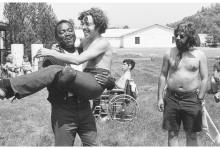
FOR A YEAR defined by isolation, 2020 has been fascinatingly full of stories about relationship. It feels oddly appropriate that during a time when we’re constantly confronting our divisions—ideological and physical—we’ve been surrounded by cinematic reminders of the importance of community and the various ways we find it. Films of 2020 have come out largely through streaming platforms, and we’ve watched them in our homes, by ourselves. They’ve still managed, however, to inspire connection.
Kirsten Johnson’s documentary Dick Johnson Is Dead chronicled her father’s dementia by celebrating her dad’s life, while Natalie Erika James’ horror film Relic addressed the real-life existential terror of watching a loved one’s mind fade to the same disease. Other films such as Spike Lee’s Da 5 Bloods and Sofia Coppola’s On the Rocks examined how adult children relate to their parents’ flaws. Of course, family doesn’t have to mean the people we share our genes with. Movies this year addressed found families too, from Crip Camp’s community of disability activists to The Old Guard’s fiercely devoted group of immortal warriors. Even popcorn fare such as Bill & Ted Face the Music celebrated the way long-standing bonds support us throughout our lives and help us in turn to love others.

FOR BLACK people in the U.S.—a collective from which lives are still stolen on a daily basis, as though the slave-boat travels of 1619 never ended but merely set course in new directions to the same destination—reclamation is essential. Perhaps our history motivated the poet Nikky Finney’s father to repurpose a phrase that long had a negative connotation into a moniker to give his daughter positive focus.
“My mother steeped us in the stories of Black history and my father named me ‘Love Child’ in order not to give anyone else the opportunity to distract me from what I had come to earth to be,” writes Finney, winner of the 2011 National Book Award for Poetry, in her newest collection, Love Child’s Hotbed of Occasional Poetry. “So be she.”
And so she is. About a month into quarantine 2020, Finney released perhaps the most history-and-affection-freighted book to be published this harrowing year. Love Child’s Hotbed cannot be read on a Kindle. Less a typical, slender publication of modern verse, and more a hefty coffee-table book of startling import, it brings to mind The Black Book, that historical anthology co-edited in 1974 by Toni Morrison, the eventual Nobel laureate in literature who was an editor at the publishing company Random House. A book that strove to contain the vast lives of Black people in the U.S.—their horrific experiences and their magnanimous achievements—The Black Book was a gift to the nation’s children and grandchildren of slaves (and even inspired one of the greatest novels of all time, Morrison’s Beloved). Likewise, in a time of immense death and thus plundering of families, Finney’s latest book is a blessing for a continuously undone but never destroyed people, reaching into the past to grasp hope and self-worth to sustain their future.

I don’t begrudge Ethan Hawke for wanting to play John Brown and producing this project. John Brown’s life was vast and exciting; his willingness to take up arms to defeat injustice mirrors conversations we still have in the church today about nonviolence.

In an effort to call faith-based communities to action during the 2020 election season, his grandson Rev. Dr. Otis Moss III, pastor of Chicago’s Trinity United Church of Christ, shares his family’s story in the 14-minute film, Otis’ Dream.
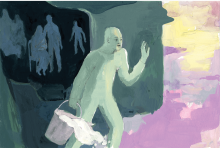
I reckon it was the girl,
not more than fourteen. Those eyes.
Something made him stop his talk,
hoist down the lantern and mutter out with them.
And that was one sour night—
dust and wind, things banging;